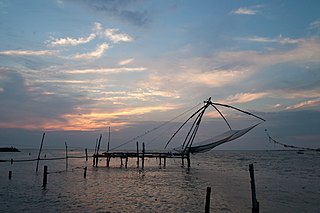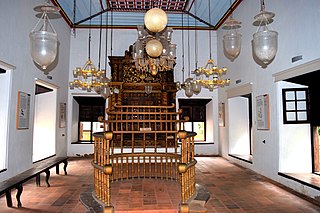
A synagogue, also called a shul or a temple, is a place of worship for Jews and Samaritans. It has a place for prayer where Jews attend religious services or special ceremonies such as weddings, bar and bat mitzvahs, choir performances, and children's plays. They also have rooms for study, social halls, administrative and charitable offices, classrooms for religious and Hebrew studies, and many places to sit and congregate. They often display commemorative, historic, or modern artwork alongside items of Jewish historical significance or history about the synagogue itself.

Cochin Jews are the oldest group of Jews in India, with roots that are claimed to date back to the time of King Solomon. The Cochin Jews settled in the Kingdom of Cochin in South India, now part of the present-day state of Kerala. As early as the 12th century, mention is made of the Jews in southern India by Benjamin of Tudela.
The history of the Jews in India dates back to antiquity. Judaism was one of the first foreign religions to arrive in the Indian subcontinent in recorded history. Rabbi Eliezer ben Jose of the 2nd-century CE mentions the Jewish people of India in his work Mishnat Rabbi Eliezer, saying that they are required to ask for rain in the summer months, during their regular rainy season, yet make use of the format found for winter in the Standing Prayer, and to cite it in the blessing, 'Hear our voice'. Desi Jews are a small religious minority who have lived in the region since ancient times. They were able to survive for centuries despite persecution by Portuguese colonizers and nonnative antisemitic inquisitions.

Synagogue architecture often follows styles in vogue at the place and time of construction. There is no set blueprint for synagogues and the architectural shapes and interior designs of synagogues vary greatly. According to tradition, the Shekhinah or divine presence can be found wherever there is a minyan, a quorum, of ten. A synagogue always contains a Torah ark where the Torah scrolls are kept, called the aron qodesh by Ashkenazi Jews and the hekhal by Sephardic Jews.

Paradesi Jews refer to Jewish immigrants to the Indian subcontinent during the 15th and 16th centuries following the expulsion of Jews from Spain and Portugal. Paradesi means foreign in Malayalam and Tamil. These Sephardic immigrants fled persecution and death by burning in the wake of the 1492 Alhambra Decree and King Manuel's 1496 decree expelling Jews from Portugal. They are sometimes referred to as "White Jews", although that usage is generally considered pejorative or discriminatory and refers to relatively recent Jewish immigrants, predominantly Sephardim.

The Paradesi Synagogue or the Mattancherry Synagogue is a synagogue located in Mattancherry Jew Town, a suburb of the city of Kochi, Kerala, in India. It was built in 1568 A.D. by Samuel Castiel, David Belila, and Joseph Levi for the flourishing Paradesi Jewish community in Kochi. Cochin Jews were composed mainly of the much older Malabari Jews and the newly arrived Sephardic refugees from the Portuguese religious persecution of Jews in Spain and Portugal. It is the oldest active synagogue in the Commonwealth of Nations. Paradesi is a word used in several Indian languages, and the literal meaning of the term is "foreigners", applied to the synagogue because it was built by Sephardic or Portuguese-speaking Jews, some of them from families exiled in Aleppo, Safed and other West Asian localities.

Fort Kochi, formerly known as Fort Cochin or British Cochin, is a region of Kochi city in Kerala, India. Fort Kochi takes its name from the Fort Manuel of Kochi, the first European fort on Indian soil, controlled by the Portuguese East Indies. This is part of a handful of water-bound islands and islets toward the south-west of the mainland Kochi, and collectively known as Old Kochi or West Kochi. Adjacent to this is the locality of Mattancherry. In 1967, these three municipalities along with a few adjoining areas, were amalgamated to form the Kochi Municipal Corporation.

Mattancherry, is a historic ward of Kochi, Kerala. It is about 9 km south-west from the city centre. Mattanchery is home to many sites of historical and cultural significance, including the Paradesi Synagogue- which was the centre of life in the Jewish Quarter. In addition to the Cochin Jews and Paradesi Jews, Mattanchery is also home to Konkanis and Gujaratis, with the Gujarati street in Mattancherry being a cultural icon for Keralite Gujaratis.

There are many synagogues in the Indian subcontinent, although many no longer function as such and today vary in their levels of preservation. These buildings dating from the mid-sixteenth through the mid-20th century once served the country's three distinct Jewish groups—the ancient Cochin Jews, and Bene Israel communities as well as the more recent Baghdadi Jews.

Indian Jews in Israel are immigrants and descendants of the immigrants of the Indian Jewish communities, who now reside within the State of Israel. Indian Jews who live in Israel include thousands of Cochin Jews and Paradesi Jews of Kerala; thousands of Baghdadi Jews from Mumbai and Kolkata; tens of thousands from the Bene Israel of Maharashtra and other parts of British India and the Bnei Menashe of Manipur and Mizoram.
Abraham ben Barak Salem was an Indian nationalist and Zionist, a lawyer and politician, and one of the most prominent Cochin Jews of the twentieth century. Popularly known by his epithet of "Jewish Gandhi", he was known as "Salem Kocha" to the resident Jewish community of Cochin. A descendant of Meshuchrarim, he was the first Cochin Jew to become an attorney. He practised in Ernakulam, where he eventually used Satyagraha to fight the discrimination among Paradesi Jews against Malabari Jews. An activist in the trade union and Indian national causes, he later was attracted to Zionism. After visiting Palestine in the 1930s, he later helped arrange the migration of most Cochin Jews to Israel by 1955. He stayed in Kochi for the remainder of his life.

Historic synagogues include synagogues that date back to ancient times and synagogues that represent the earliest Jewish presence in cities around the world. Some synagogues were destroyed and rebuilt several times on the same site. Others were converted into churches and mosques or used for other purposes.

The Kochangadi Synagogue, or Misro Synagogue, was an historic Orthodox Jewish congregation and synagogue, located in Kochangadi, south of Jew Town in Kochi, in the coastal state of Kerala, India.

The Chendamangalam Synagogue is a former Orthodox Jewish congregation and synagogue, located in Chendamangalam, a village in the Ernakulam district of the coastal state of Kerala, in India. Completed in 1420 CE, the building was abandoned in 1950s, and was subsequently repurposed as a Jewish museum.

The Paravur Synagogue, also known as the Parur Synagogue, is a former Orthodox Jewish congregation and synagogue, located on Jewish Street in North Paravur (Parur), in the state of Kerala, India. The former synagogue is one of the largest and most complete among the Jewish synagogues in Kerala.

The Kadavumbhagam Mattancherry Synagogue, also known as the Kadavumbhagam Synagogue, is a former Orthodox Jewish congregation and synagogue, located in Mattancherry, a locality in Kochi, in the Ernakulam district, in the coastal state of Kerala, India.

The Kadavumbhagham Ernakulam Synagogue is a Jewish congregation and synagogue, located in Kochi, in the Ernakulam district in the state of Kerala, India.















